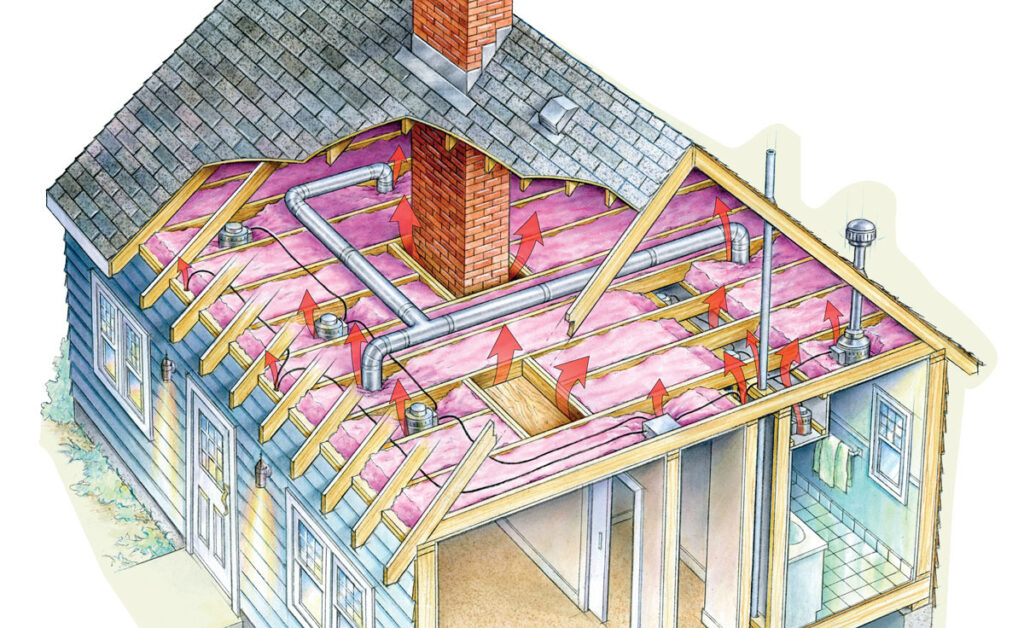I. Introduction
Definition of Attic Insulation: Attic insulation is a material used to insulate and improve the energy efficiency of homes and buildings. It is usually made of fiberglass, cellulose, foam, or other materials and is placed in the attic space to prevent heat transfer between living spaces and the outdoors.
Importance of Attic Insulation for Energy Efficiency: Attic insulation is crucial for energy efficiency because it helps regulate the temperature inside the home and reduce energy loss through the roof. Proper attic insulation can lower energy bills, increase indoor comfort, and extend the lifespan of heating and cooling systems.
Overview of the article: This article explains the benefits of attic insulation and how it can save you money on energy bills. The outline will cover the impact of attic insulation on energy efficiency, the different types of attic insulation available, and the factors to consider when choosing the right insulation for your home.
II. The Benefits of Attic Insulation
Reduction of Energy Costs: Attic insulation helps reduce energy costs by preventing heat loss and gain through the roof. When your home is properly insulated, you’ll use less energy to heat or cool it, which means lower energy bills.
Improved Indoor Comfort: Proper attic insulation can help regulate indoor temperatures and reduce drafts, improving indoor comfort. In addition, it can also help reduce noise from outside and improve the overall quality of life inside the home.
Increased Energy Efficiency: Attic insulation is important to a home’s overall energy efficiency. It helps prevent heat transfer between the living spaces and the outdoors, so your heating and cooling systems won’t have to work as hard to maintain a comfortable temperature.
Enhanced Indoor Air Quality: Attic insulation can also have a positive impact on indoor air quality. Preventing air leaks can reduce the number of pollutants and allergens entering the home, improving the health and well-being of the residents.
III. How Attic Insulation Saves You Money
Preventing Heat Loss and Gain: Attic insulation prevents heat loss in the winter and heat gain in the summer. This means you’ll use less energy to maintain a comfortable temperature, which translates to lower energy bills.
Reducing HVAC Usage: Attic insulation can reduce the strain on your heating and cooling systems, which means they’ll last longer and require less maintenance. This can save you money on repair and replacement costs over time.
Lowering Energy Bills: The combination of reduced heat loss and gain, reduced HVAC usage, and increased energy efficiency means that attic insulation can significantly lower your energy bills.
Increasing Home Value: In addition to saving you money on energy bills, attic insulation can also increase the value of your home. Energy-efficient homes are in high demand, and proper insulation is one of the key components of a home’s energy efficiency.
IV. Types of Attic Insulation
Fiberglass Batts: Fiberglass batts are a popular choice for attic insulation because they are affordable, easy to install, and effective at preventing heat transfer. They come in pre-cut lengths that fit between the attic joists, making them a convenient option for DIY installation.
Spray Foam: Spray foam is a type of insulation applied as a liquid that expands to fill the space. It provides an airtight seal, making it an excellent option for preventing air leaks and improving indoor air quality. Spray foam is more expensive than fiberglass batts, but it is also more effective at preventing heat transfer and improving energy efficiency.
Blown-In Insulation: Blown-in insulation is made from cellulose, fiberglass, or other materials and is blown into the attic space using specialized equipment. It is a convenient option for attics with irregular shapes or tight spaces, and it can be added to existing insulation to increase its effectiveness.
Comparison of the Different Types: The attic insulation you choose will depend on your specific needs, budget, and preferences. Fibreglass batts are a good option for those looking for affordability and ease of installation. At the same time, spray foam is ideal for those looking for maximum energy efficiency and improved indoor air quality. Blown-in insulation is a versatile option that can be customized to meet the unique needs of your attic.
V. Choosing the Right Attic Insulation
Factors to Consider: When choosing the right attic insulation, consider factors such as your budget, the type of roof you have, the amount of insulation currently in your attic, and the climate you live in. It is also important to consider the R-value, which measures the insulation’s effectiveness, and the environmental impact of the insulation material.
Professional Recommendations: It is always a good idea to seek the advice of a professional when choosing the right insulation for your attic. A professional can help you assess your needs and recommend the best option for your home.
Cost and Budget: The cost of attic insulation can vary depending on the type of insulation you choose and the size of your attic. It is important to consider your budget, when choosing the right insulation and factor in the long-term savings you will receive from lower energy bills.
VI. Attic Insulation Installation and Maintenance
Importance of Professional Installation: Installing attic insulation can be a complex and dangerous process, so it is important to have it done by a professional. A professional can ensure that the insulation is installed correctly and that the job is done safely.
Maintenance and Upkeep: Proper maintenance and upkeep are essential to ensure that your attic insulation continues to perform effectively. This includes checking the insulation regularly for signs of damage or settling and making necessary repairs.
Tips for Proper Insulation Maintenance: To maintain the effectiveness of your attic insulation, it is important to keep the attic space free of clutter, avoid storage of flammable materials, and keep the vents and air ducts free from blockages. Pure Energy Window Company Regular inspections and air sealing of the attic space can also help to maintain the insulation’s effectiveness.

